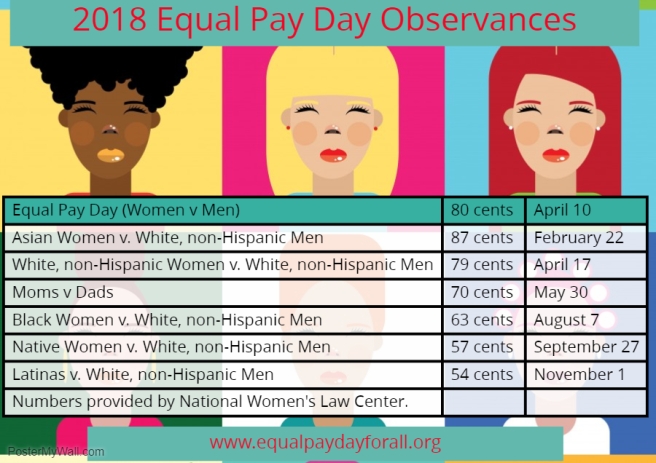I wish I could say that the title of this post wasn’t true. It should be false. In my ideal world it’s false. In my head it’s false. In my gut it’s false. That statement feels like sandpaper eroding every nerve ending in my body.
Unfortunately in a majority of workplaces, including mine, this statement is very true.
If you are unaware, today is Equal Pay Day. Today represents how far a woman would have to work into 2018 to make a much as a man made for the year 2017.
If you are a woman of ethnicity, you have to work further into 2018.

For Native Americans, like myself, the equal pay day is September 27.
This inequality is far reaching. It’s like a toxic waste spill. You see it initially as small and inconsequential but underneath the surface it spreading and affecting everyone around you. I can’t speak for all women but I can convey my experience with this issue.
I find myself in the circumstance of being paid less than a male counterpart who holds the same position, has no more responsibility and was hired a year after I was. There is no logical reason for this pay disparity.
The first time, I became aware of a pay difference with a fellow male co-worker, although it bothered me, I told myself there must a valid reason. After all, the company I work for is liberal minded and is progressive in it’s corporate culture.
Fool me once…
I pride myself on being a stellar contributor at work, no matter what work it is. I do more than asked. I learn as much as I can. I go the extra mile. I can’t help it. I’m wired that way.
So on the surface, I’m that smiling face listening to your questions, giving you information and fulfilling needs. Underneath, I’m filled with anxiety about how I’m going to pay for that badly needed set of tires AND put food on the table for my kid. (I just did the math and the pay difference for the year 2017 would have covered a set of new tires for my Toyota Yaris.)
The pay inequality can have crushing consequences not only on finances but spirit as well, especially for single mothers.
My daughter was with me in the grocery store one day and saw a woman pushing a cart brimming with groceries. She marveled at how much the lady was buying and thought out loud, “She must be rich!” I looked at our almost empty cart of necessities. It struck me how long it had been since I have been able to go to the store and buy whatever I wanted without thought of cost.
Children of single mothers can pay the cost of inequality in lack of nutrition, lack of opportunities, lack of proper health care and so on.
In my professional life, I can’t emphasize enough how defeating it feels to know that you are valued less than a male co-worker even when you put in 10X more effort and have the results to show for it. Frustration becomes a constant companion.
The clear message your employer is giving you when you are paid less than a male co-worker for the same job is, “You are not equal. You are not valued. You are not respected.”
We need to change this. We already have the Equal Pay Act but clearly that’s not enough.
For starters, employers can be more transparent about pay ranges. I once worked for a company that posted the pay ranges for each position. For me, that was a wonderful tool to negotiate my starting pay.
All employees can be proactive. It is not against the law to discuss your pay with fellow employees. Companies discourage this because it is in their own best interest to keep wages as low as possible. Until it is mandated that companies report their wage rates and are accountable, we should encourage solidarity with our fellow co-workers.
When job searching, you don’t have to disclose your current or former salary. That has no bearing on the job you are applying for.
Those are just a few suggestions I have come up with. Action is needed on all levels. After all, 55 years is more than enough time to work the wrinkles out, don’t you think?
The amendment to the Fair Labor Standards Act was approved on June 10, 1963 and is know as the “Equal Pay Act of 1963.” It states the following:
SEC. 206. [Section 6]
(d) Prohibition of sex discrimination
(1) No employer having employees subject to any provisions of this section shall discriminate, within any establishment in which such employees are employed, between employees on the basis of sex by paying wages to employees in such establishment at a rate less than the rate at which he pays wages to employees of the opposite sex in such establishment for equal work on jobs the performance of which requires equal skill, effort, and responsibility, and which are performed under similar working conditions, except where such payment is made pursuant to (i) a seniority system; (ii) a merit system; (iii) a system which measures earnings by quantity or quality of production; or (iv) a differential based on any other factor other than sex: Provided, That an employer who is paying a wage rate differential in violation of this subsection shall not, in order to comply with the provisions of this subsection, reduce the wage rate of any employee.